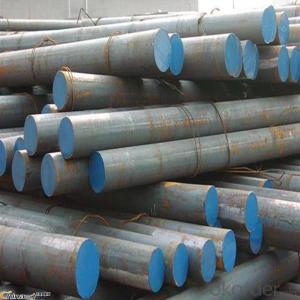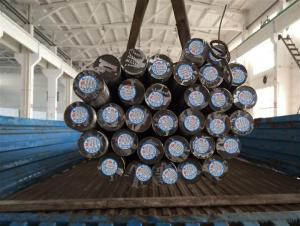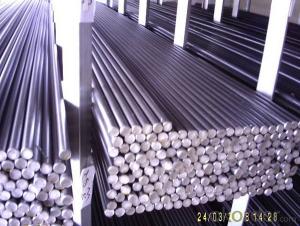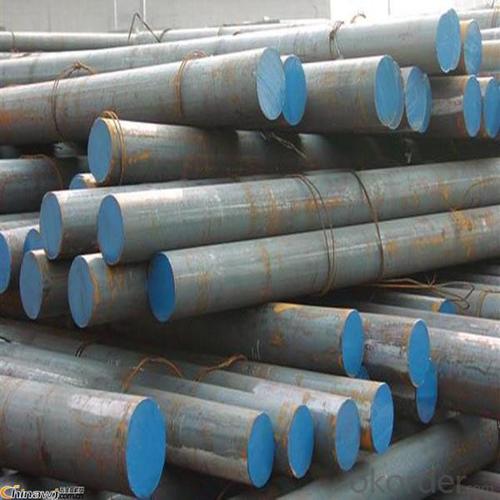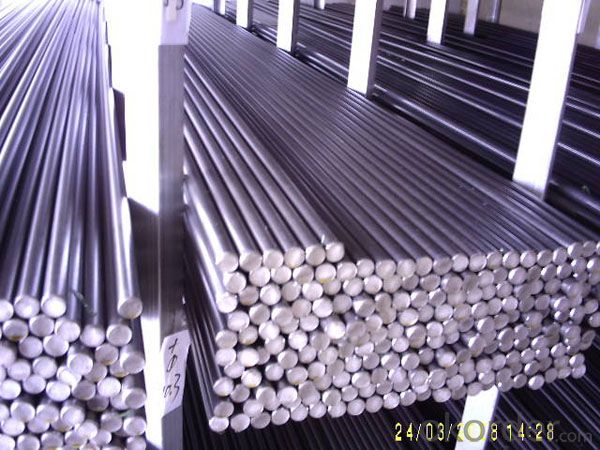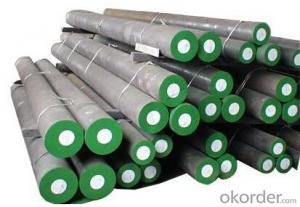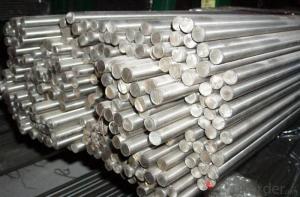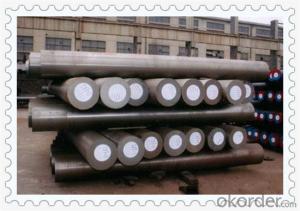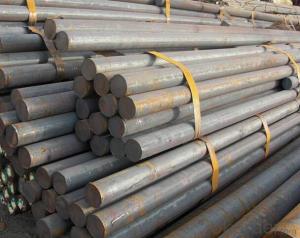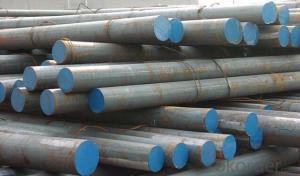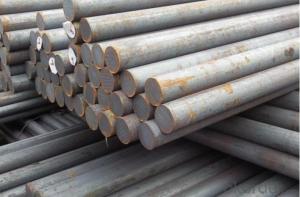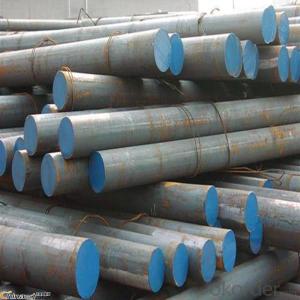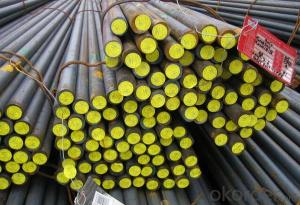AISI 4140 Steel, SAE 4140 Steel Round Bar
- Loading Port:
- China main port
- Payment Terms:
- TT OR LC
- Min Order Qty:
- 30 m.t.
- Supply Capability:
- 10000 m.t./month
OKorder Service Pledge
OKorder Financial Service
You Might Also Like
Specification
AISI 4140 Steel, SAE 4140 Steel Round Bar
Product Information:
| Size | ||||||||
| Round bar | Diameter(mm) | Length (mm) | ||||||
| 20~800 | 3000~9000 | |||||||
| Plate | Thickness(mm) | Width (mm) | Length (mm) | |||||
| Max:800 | Max:2200 | Max:9000 | ||||||
| The specification can be customized. | ||||||||
| Chemical Compositons | ||||||||
| Grade | C | Si | Mn | P | S | Cr | Mo | Ni |
| 42CrMo | 0.38~0.45 | 0.17~0.37 | 0.50~0.8 | ≤0.035 | ≤0.035 | 0.9~1.2 | 0.15-0.25 | ≤0.3 |
| 4140 | 0.40~0.45 | 0.15~0.35 | 0.75~1.0 | ≤0.035 | ≤0.040 | 0.8~1.1 | 0.15-0.25 | - |
| SCM44 | 0.38~0.43 | 0.15~0.35 | 0.60~0.9 | ≤0.030 | ≤0.030 | 0.9~1.2 | 0.15-0.30 | ≤0.25 |
| 1.7225 | 0.38~0.45 | ≤0.40 | 0.60~0.9 | ≤0.025 | ≤0.035 | 0.9~1.2 | 0.15-0.30 | |
Features of 4140 alloy steel
1, Chromium molybdenum alloy steel
2, Slightly higher carbon content then 4130
3, Greater strength and heat treatment
Typical Applications
1, Applications in the oil and gas sector
2, Connection rods, collets, conveyor pins,
3, Gears, stem assemblies,
4, Pump shafts and tool holders
Product Overviews:
| Product Name | Typical Grades | Diameter(mm) | Standard adopted |
| Carbon Steel | 20 (1020/S20C/C22) | Ø16-Ø300 | GB/SAE/JIS/DIN |
| 40 (1040/S40C/C40) | |||
| 45 (1045/S45C/C45) | |||
| Bearing Steel | GCr9 (51100/SUJ1) | Ø12-Ø250 | |
| GCr15 (52100/SUJ2/100Gr6) | |||
| GCr9SiMn (A485-Gr.1/SUJ3) | |||
| Cr-Mo Steel | 20Cr (5120/SCr420H/20Cr4) | Ø12-Ø250 | |
| 40Cr (5140/SCr440/41Cr4) | |||
| 42CrMo(4140/SCM440/42CrMo4) | |||
| Gear Steel | 20CrNiMo | Ø16-Ø600 | |
| 20CrMn(5115/SMnC420/20MnCr5) | |||
| 20CrNiMo(8620/SNCM220/20CrMiMo2) |
Product Show:

Our Advantages:
· Industry experience over 20 years.
· Shipment of goods -More than 70 countries worldwide.
· The most convenient transport and prompt delivery.
· Competitive price with best service.
· High technical production line with top quality products.
· High reputation based on best quality products.
With our experienced, enthusiastic and dynamic staffs, we assure to bring you the products with best quality, reasonable prices and good after-sales services under the motto: Friends First, Business After.
Communication, Experience, Expertise and Best efforts are our Promises to you.
- Q: What are the applications of special steel in the aerospace sector?
- Due to its exceptional properties and capabilities, special steel finds numerous applications in the aerospace sector. Firstly, it is utilized in the manufacturing of aircraft engines. Special steel's high strength and temperature resistance make it an ideal choice for components such as turbine blades and discs, which experience extreme heat and stress during operation. Moreover, special steel provides excellent corrosion resistance, ensuring the durability and reliability of vital engine parts. Another important application of special steel in the aerospace sector involves constructing aircraft structures. Special steel alloys are employed to fabricate landing gear, wing components, and other structural elements. The high strength-to-weight ratio of special steel enables the production of lightweight yet sturdy structures, contributing to fuel efficiency and overall performance. Special steel is also essential in producing aerospace fasteners, including bolts, nuts, and screws that secure various aircraft components together. Special steel's exceptional mechanical properties, fatigue resistance, and vibration resistance make it an ideal material for fasteners, ensuring the integrity and safety of aircraft assemblies. Furthermore, special steel is utilized in aerospace tooling and equipment. Tools used in the manufacturing process, such as cutting tools and molds, are often made from special steel. Its high hardness and wear resistance enable efficient and precise machining of aerospace components. Additionally, special steel is employed in the production of specialized equipment, such as test rigs, calibration devices, and ground support equipment, which are crucial for aerospace operations and maintenance. In conclusion, special steel plays a crucial role in the aerospace sector, contributing to the overall safety, performance, and reliability of aerospace systems. Its use in aircraft engines, structures, fasteners, and tooling is indispensable for the demanding and critical applications within the aerospace industry, thanks to its unique properties.
- Q: Can special steel be used in the transportation industry?
- Yes, special steel can be used in the transportation industry. Special steel alloys possess excellent strength, durability, and corrosion resistance properties, making them suitable for various applications in transportation, such as manufacturing of vehicle components, structural parts, and machinery. These steels can enhance the overall performance, safety, and efficiency of vehicles, ensuring long-lasting and reliable performance, even under challenging conditions.
- Q: What are the properties of ultra-high-strength alloy steel?
- Ultra-high-strength alloy steel possesses exceptional strength and durability due to its unique composition. It typically contains a combination of various metals, such as chromium, nickel, and molybdenum, which contribute to its enhanced mechanical properties. This type of steel exhibits superior tensile strength, allowing it to withstand extremely high loads and resist deformation. Additionally, it offers excellent toughness, meaning it can absorb energy without fracturing. Ultra-high-strength alloy steel also exhibits good corrosion resistance, making it suitable for applications in harsh environments. Overall, its remarkable properties make it an ideal choice for demanding engineering and structural applications.
- Q: What are the different methods of surface thermal spraying for special steel?
- There are several different methods of surface thermal spraying that can be used for special steel. These methods include: 1. Flame spraying: In this method, a flame or oxy-fuel source is used to melt the coating material, which is then sprayed onto the surface of the special steel. This method is commonly used for applying coatings such as zinc, aluminum, or their alloys. 2. Arc spraying: Arc spraying involves using an electric arc to melt the coating material, which is then propelled onto the surface of the special steel using compressed air. This method is often used for applying coatings such as stainless steel, nickel alloys, or copper. 3. Plasma spraying: Plasma spraying utilizes a plasma torch to heat and melt the coating material, which is then propelled onto the surface of the special steel. This method is particularly effective for applying coatings such as ceramic or metallic materials with high melting points. 4. High-velocity oxy-fuel (HVOF) spraying: HVOF spraying involves using a high-pressure combustion process to propel the coating material onto the surface of the special steel. This method produces coatings with high bond strength and density, making it suitable for applications requiring wear resistance or corrosion protection. 5. Detonation spraying: Detonation spraying utilizes a controlled detonation process to accelerate the coating material onto the surface of the special steel. This method is often used for applying coatings such as tungsten carbide or other hard materials, providing excellent wear resistance. Each of these methods of surface thermal spraying offers distinct advantages and is selected based on the specific requirements of the special steel application, including the desired coating material, thickness, and performance characteristics.
- Q: How does special steel contribute to the telecommunications equipment industry?
- The telecommunications equipment industry greatly relies on special steel to support its complex infrastructure and advanced technologies. Special steel plays a critical role by providing the necessary strength, durability, and reliability. An important aspect of special steel is its ability to withstand extreme weather conditions and environmental factors. Telecommunications equipment, such as transmission towers, antennas, and satellites, often face harsh elements like strong winds, heavy rain, and earthquakes. Special steel, with its high tensile strength and resistance to corrosion, ensures the stability and longevity of the infrastructure, minimizing the risk of damage or failure. Additionally, special steel is used in the production of various components for telecommunications equipment. Connectors, cables, and electronic enclosures, for example, require materials with excellent electrical conductivity and heat dissipation properties. Special steel alloys, including stainless steel or nickel-based alloys, are utilized to meet these requirements, ensuring efficient signal transmission and preventing overheating issues. Furthermore, special steel is crucial for manufacturing high-quality tools and equipment used in the installation, maintenance, and repair of telecommunications networks. Specialized steel alloys, such as tool steel, provide exceptional hardness, toughness, and wear resistance, enabling the production of reliable and long-lasting tools. These tools are essential for professionals in the telecommunications industry as they allow for efficient and accurate installation and maintenance, ensuring uninterrupted connectivity for end-users. Moreover, as the telecommunications industry continues to advance, special steel is vital in supporting the deployment of advanced technologies like 5G networks and fiber-optic systems. These technologies require specialized components, such as waveguides, reflectors, and amplifiers, often made from special steel alloys to ensure optimal performance and durability. By providing the necessary materials for these cutting-edge technologies, special steel contributes to the expansion and enhancement of telecommunications infrastructure worldwide. In conclusion, special steel is indispensable to the telecommunications equipment industry due to its strength, durability, and reliability, which are crucial for infrastructure, components, tools, and advanced technologies. Its unique properties enable the industry to provide efficient and uninterrupted communication services to individuals and businesses globally.
- Q: What are the different forming techniques for special steel?
- Some of the different forming techniques for special steel include forging, rolling, extrusion, and casting.
- Q: What are the main factors affecting the heat resistance of special steel?
- The main factors affecting the heat resistance of special steel include its composition, microstructure, and processing techniques. The composition of the steel, particularly the presence of alloying elements such as chromium, nickel, and molybdenum, can greatly influence its ability to withstand high temperatures. Additionally, the microstructure of the steel, which is determined by factors like heat treatment and grain size, plays a significant role in its heat resistance. Finally, the processing techniques used during the manufacturing of the steel, such as forging or casting, can also impact its ability to withstand heat.
- Q: Can special steel be used in the oil and gas equipment manufacturing industry?
- Yes, special steel can be used in the oil and gas equipment manufacturing industry. Special steels, such as stainless steel and alloy steel, are commonly utilized in this industry due to their superior corrosion resistance, high strength, and ability to withstand harsh operating conditions. These steels ensure the reliability and durability of oil and gas equipment, making them suitable for applications such as pipelines, valves, and drilling equipment.
- Q: What are the different surface treatments for special steel?
- There are several different surface treatments available for special steel, each serving a specific purpose and offering unique advantages. Some of the most common surface treatments for special steel include: 1. Galvanizing: This process involves coating the steel with a layer of zinc, which provides excellent corrosion resistance. Galvanizing is a popular choice for outdoor applications where the steel is exposed to moisture and harsh environmental conditions. 2. Powder coating: Powder coating involves applying a dry powder to the steel surface, which is then heated and cured to form a durable and protective coating. This treatment offers excellent resistance against corrosion, chemicals, and UV rays, making it ideal for various applications, including automotive parts, appliances, and outdoor furniture. 3. Nitriding: Nitriding is a surface hardening treatment that involves diffusing nitrogen into the steel surface. This process significantly increases the surface hardness, wear resistance, and fatigue strength of the steel. Nitriding is commonly used for high-performance components, such as gears, crankshafts, and injection molding screws. 4. Electroplating: Electroplating involves depositing a layer of metal, such as chromium, nickel, or gold, onto the steel surface through an electrochemical process. This treatment enhances the steel's appearance, provides corrosion resistance, and improves wear resistance. Electroplating is often used for decorative purposes or to enhance the performance of components in various industries. 5. Passivation: Passivation is a chemical treatment that removes iron contaminants from the steel surface, creating a passive oxide layer. This layer acts as a barrier against corrosion, improving the steel's resistance to rust and other forms of degradation. Passivation is commonly used for stainless steel components in industries such as food processing, pharmaceuticals, and medical devices. 6. Carbonitriding: Carbonitriding is a surface treatment that involves introducing carbon and nitrogen into the steel surface at high temperatures. This process forms a hardened case, improving wear resistance and fatigue strength. Carbonitriding is often used for high-stress components, such as gears, crankshafts, and camshafts. These are just a few examples of the different surface treatments available for special steel. The choice of treatment depends on various factors, including the desired properties, application requirements, and budget constraints. It is essential to consult with experts or manufacturers to determine the most suitable surface treatment for specific steel applications.
- Q: How does special steel contribute to the circular economy?
- Special steel contributes to the circular economy by enabling the recycling and reuse of materials. Its high durability and strength make it ideal for applications that require longevity and performance, allowing products made from special steel to have a longer lifespan. Additionally, special steel can be easily recycled and repurposed without losing its properties, reducing the need for virgin steel production and minimizing waste. By promoting a closed-loop system, special steel plays a crucial role in conserving resources, reducing environmental impact, and creating a more sustainable economy.
Send your message to us
AISI 4140 Steel, SAE 4140 Steel Round Bar
- Loading Port:
- China main port
- Payment Terms:
- TT OR LC
- Min Order Qty:
- 30 m.t.
- Supply Capability:
- 10000 m.t./month
OKorder Service Pledge
OKorder Financial Service
Similar products
Hot products
Hot Searches
Related keywords
